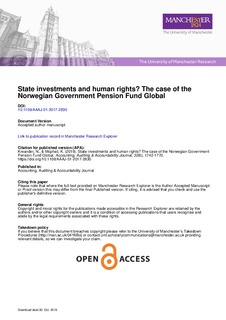| dc.contributor.author | Kreander, Niklas Valter | |
| dc.contributor.author | McPhail, Ken | |
| dc.date.accessioned | 2019-10-30T10:39:46Z | |
| dc.date.available | 2019-10-30T10:39:46Z | |
| dc.date.created | 2019-09-12T14:37:23Z | |
| dc.date.issued | 2019 | |
| dc.identifier.citation | Accounting, Auditing & Accountability Journal. 2019, 32 (6), 1742-1770. | nb_NO |
| dc.identifier.issn | 1368-0668 | |
| dc.identifier.uri | http://hdl.handle.net/11250/2625357 | |
| dc.description | Please note that where the full-text provided on Manchester Research Explorer is the Author Accepted Manuscript or Proof version this may differ from the final Published version. If citing, it is advised that you check and use the publisher's definitive version. Copyright and moral rights for the publications made accessible in the Research Explorer are retained by the authors and/or other copyright owners and it is a condition of accessing publications that users recognise and abide by the legal requirements associated with these rights. | nb_NO |
| dc.description.abstract | Abstract Purpose - The paper explores how the Norwegian Government incorporated its responsibility for human rights into the investment practices of its Global Pension Fund and how human rights issues were negotiated when exclusion was considered. Design/Methodology/approach - Drawing on a series of interviews we analyse the way in which responsibility for human rights has been translated into the practices of the Norwegian Government Pension Fund Global. Findings - The paper documents how a large investment fund used several mechanisms to address human rights risks. We demonstrate that different logics among actors sometimes impeded addressing human rights issues. Our findings demonstrate that sovereign wealth funds can be held accountable for human rights. Research limitations/implications - The paper illustrates the difficulty of co-operation between actors with different logics. This can result in institutional conflict, but also in positive outcomes for human rights. Practical implications - Attempts to introduce human rights into state investments may result in increased insitutional complexity. Our findings indicate that state investors can address human rights issues, but that the ability to do so is diminished where divestment creates political tension. Social implications - Large investors can influence companies on specific human rights issues. Originality/value - This is one of the first empirical investigations of the human rights practices of a sovereign wealth fund. We contribute to the literatures on accounting and human rights, sovereign wealth funds and institutional theory. Keywords Human rights, Sovereign wealth fund, Institutional theory, Responsible investment, Accountability Paper type Research paper | nb_NO |
| dc.language.iso | eng | nb_NO |
| dc.subject | Human Rights | nb_NO |
| dc.subject | Etiske investeringer | nb_NO |
| dc.subject | Socially responsible investments | nb_NO |
| dc.subject | Institusjonell teori | nb_NO |
| dc.subject | Institutional theory | nb_NO |
| dc.title | State investments and human rights? The case of the Norwegian Government Pension Fund Global | nb_NO |
| dc.type | Journal article | nb_NO |
| dc.type | Peer reviewed | nb_NO |
| dc.description.version | acceptedVersion | nb_NO |
| dc.subject.nsi | VDP::Bedriftsøkonomi: 213 | nb_NO |
| dc.subject.nsi | VDP::Business: 213 | nb_NO |
| dc.source.pagenumber | 1742-1770 | nb_NO |
| dc.source.volume | 32 | nb_NO |
| dc.source.journal | Accounting, Auditing & Accountability Journal | nb_NO |
| dc.source.issue | 6 | nb_NO |
| dc.identifier.doi | 10.1108/AAAJ-01-2017-2830 | |
| dc.identifier.cristin | 1724053 | |
| cristin.unitcode | 222,57,1,0 | |
| cristin.unitname | Institutt for økonomi og IT | |
| cristin.ispublished | true | |
| cristin.qualitycode | 1 | |
